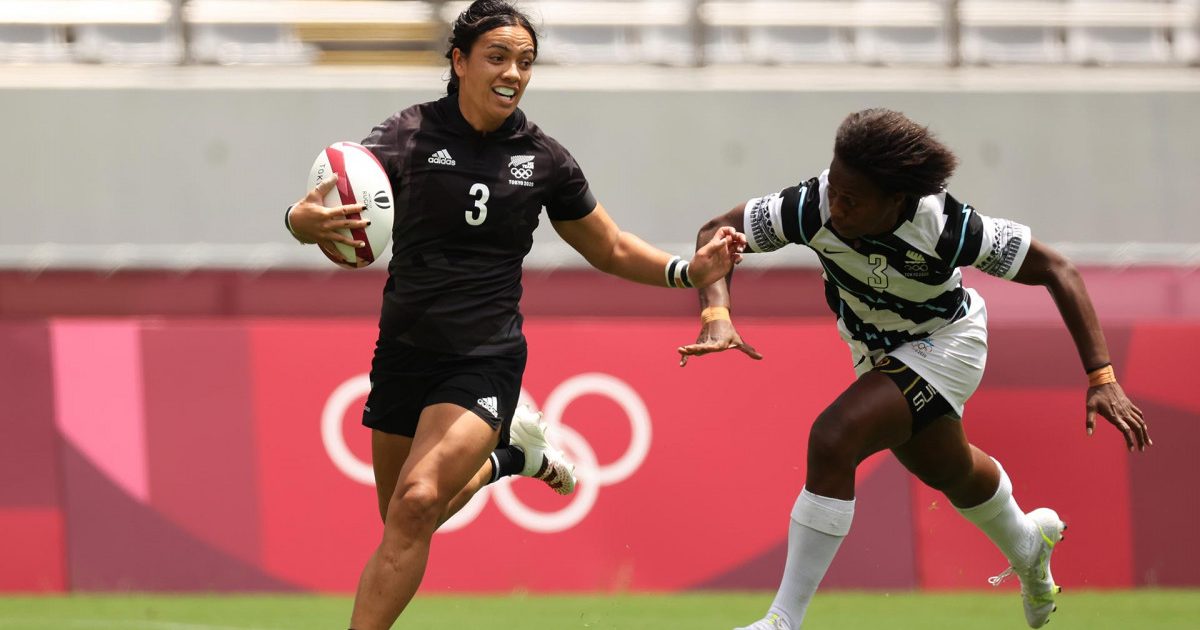NZ to play France for Olympic sevens title after tense semi-finals

New Zealand will play France for the Olympic women’s sevens title after both emerged victorious from their respective semi-finals in Tokyo on Saturday.
The Black Ferns Sevens, the gold medal favourites, avoided a shock upset at the hands of Fiji in a pulsating match that was only settled in extra-time.
The high-octane semi-final began with Gayle Broughton crossing the line in second minute to give New Zealand an expected lead early on, but the tenacity of the Fijians proved difficult to cope with for the Black Ferns Sevens.
Channelling the flamboyance that is synonymous with Fijian sevens, the Pacific Island nation, which stunned reigning Olympic champions Australia in Friday’s quarter-final, struck back a few minutes later through Vasiti Solikoviti.
Viniana Riwai’s conversion edged Fiji in front, but Ruby Tui had the chance to put the Kiwis back in front on the stroke of half-time as she charged up the middle of the field from halfway.
Some stunning defence by Fiji thwarted Tui’s try-scoring opportunity, though, as the New Zealander spilled the ball over the line to bring an end to an intense first half.
Fiji then triggered the alarm bells for the Black Ferns Sevens early in the second stanza when Solikoviti crossed for her second try little more than a minute into the new half.
Desperate for a try to bring things level, New Zealand’s calls were answered by Portia Woodman, who used pace and agility to round the defensive line and soar down the right-hand touchline and score under the posts.
Tyla Nathan-Wong converted, bringing the scores level, but Fiji threatened to reclaim the lead when Alowesi Nakoci stormed into Kiwi territory from well inside her own half.
It took a spectacular covering effort from Nathan-Wong to deny Fiji their third try, and a knock on saved the Black Ferns Sevens from a potentially devastating blow two minutes from full-time.
That enabled New Zealand to work their way back up the park and eventually score through Stacey Fluhler, who was put into acres of space from a wonderful Kelly Brazier pass.
Nathan-Wong’s seemingly stock-standard conversion attempt rattled the post, though, gifting Fiji one last chance to steal the game, if not send it to extra-time, which they grasped with both hands.
Wallabies halfback Nic White has issued a warning to the All Blacks a week out from their opening Bledisloe Cup clash of the year at Eden Park next Saturday. #AllBlacks #Wallabies #BledisloeCup https://t.co/1Xii1d3jrN
— RugbyPass (@RugbyPass) July 31, 2021
Utilising some tidy footwork and speed, Reapi Ulunisau danced through the New Zealand defensive line from the re-start and outpaced three defenders to score in the corner.
A wayward conversion attempt from out wide sent the game to extra-time with the scores locked up at 17-all, but the Black Ferns Sevens got the upper hand when they reclaimed the ball from re-start.
Holding onto the ball for three minutes straight, the Kiwis eventually broke through when Broughton beat three exhausted defenders to score her second try of the match and lock in a place in the final.
There they will meet France, who stunned a Great Britain outfit who almost solely relied on the pace of Jasmine Joyce but ultimately came up short of a place in the Olympic final.
Two early tries to Anne-Cecile Ciofani and Seraphine Okemba put the French up 14-0 after just two-and-a-half minutes, but Joyce clawed the Brits back into contention with two well-taken tries as her pace was used to full effect.
France were unrelenting in all aspects of the game, though, as their attack was in full swing while their defence was constantly in the face of the British.
Black Ferns Sevens star Ruby Tui is the latest viral sensation to come out of the Tokyo Olympics following a captivating post-match interview. #Rugby #Tokyo2020 https://t.co/wKkfMVV9sj
— RugbyPass (@RugbyPass) July 31, 2021
It’s little surprise, then, that they scored on either side of half-time as Ciofani and Coralie Bertrand both crossed for tries, but Hannah Smith’s try midway through the second half kept Great Britain just seven points astray.
A slew of penalties almost cost France their lead as the game creeped towards its closing stages, but a clutch piece of defence at the breakdown secured them with the ball as the full-time siren sounded.
An emphatic kick to touch cemented France’s place in the final, where they may back their chances after Fiji exposed that New Zealand can be exploited with enough pressure and attacking flair.
Great Britain, meanwhile, will square off against Fiji in a fight for the bronze medal.
In the other matches of the opening session on the final day of action, Australia and the United States progressed to the fifth-place play-off after dispatching the Russian Olympic Committee and China, respectively.
At the bottom end of the draw, Canada and Brazil will compete for ninth-place after they eliminated Kenya and Japan, respectively, from the competition.










































